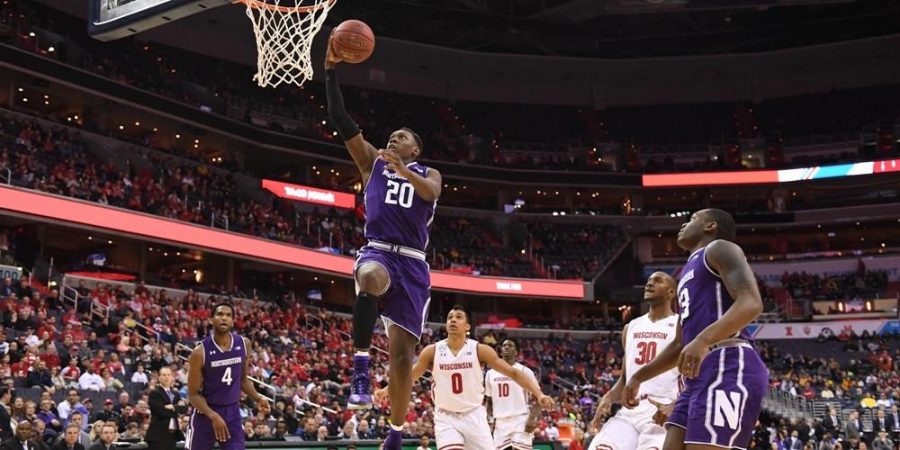It’s been quite a year of firsts for Chicago sports teams.
Not long after the Chicago Cubs took home their first World Series in over a century, the Northwestern Wildcats are going dancing for the first time in the program’s 113-year history. They made sure to add a little drama to the mix too.
Heading into their second-to-last home game of the season against the Michigan Wolverines, this team knew that a win would more than likely clinch a tournament spot. The atmosphere was electric, as a sellout crowd in Welsh-Ryan arena was ready to witness history.
After nearly 40 minutes of basketball during which neither team could gain the edge, Northwestern had the ball with 1.7 seconds needing to go all 94 feet to break the tie and give them the win. Nathan Taphorn launched a one-handed pass through the air that seemed to travel in slow motion, and it settled into the hands of Dererk Pardon, who turned and laid it off the glass as time expired. The shot fell, and Northwestern’s tournament drought fell with it.
It’s been a dream season for the Wildcats and their head coach, Chris Collins. Collins, the son of Basketball Hall of Famer Doug Collins, took the job at Northwestern in 2013 after working as an assistant at his alma mater, Duke. He inherited a program with a history of disappointment, but, being a local guy, Collins was dedicated to righting the ship. It’s easy to see his impact on this team, as the Wildcats play an extremely well-coached brand of basketball that focuses on defense on smart passing.
Northwestern’s defense has been its biggest strength all season long. The Wildcats rank 23rd in the country in defensive field goal percentage, holding their opponents to 40.3 percent, a mark that will serve them well against a Vanderbilt team that struggles to find good shots inside the arc.
They also allow an average of only 65.1 points per game, which ranks 34th in the nation. Chalk that up to the stellar play of Vic Law, a member of Collins’s first recruiting class, who holds down the fort on defense. At 6’7″, Law has the ability to guard four positions, and his perimeter defense was recognized via his selection to the Big Ten All-Defensive team last week.
On the offensive side of the ball, Bryant McIntosh runs the show. He averages 5.2 assists per game and sets the tone for an offense that assists on about 60 percent of its buckets, which ranks 23rd nationally. McIntosh was another member of Collins’ initial recruiting class and has been the point guard since the day he stepped on campus, leading the team in minutes as a freshman and again now as a junior. He is the perfect reflection of his coach on the floor, focusing on making good passes and limiting turnovers, a philosophy that has led the Wildcats to the nation’s 14th-best assist-to-turnover ratio.
While Chris Collins has had a profound impact on this team’s play on both sides of the floor, the one thing you can’t coach is athleticism, and that’s what wing Scottie Lindsey brings to this team. Northwestern might not have a definite star, but Lindsey, a junior out of Hillside, Illinois, is the closest thing to one.
Lindsey’s road to the tournament is almost as improbable as Northwestern’s, and Thursday should be a reunion of sorts for the junior. Three years ago, when Lindsey was a senior in high school, former Vanderbilt head coach Kevin Stallings recruited him heavily. Upon visiting campus, Lindsey played in a pick-up game and rose up high for a dunk. He landed hard and broke his leg, putting his college career on hold and raising red flags for possible suitors. It didn’t deter Chris Collins, though, as Collins took a chance on the injured Lindsey, one that would help complete the trifecta of stars in the 2014 recruiting class.
Now a few years later, Lindsey is thriving in Evanston. He is the spark for a sometimes stagnant Wildcats offense, with the ability to score from anywhere on the floor. Lindsey has made hit 55 threes on the year at just under 33 percent as part of an offense that loves to shoot from deep, a style that mimics Vanderbilt’s trigger-happy offense.
“Some of [Northwestern’s] stuff is actually similar to ours,” Vanderbilt head coach Bryce Drew said. “In transition, they’re going to run a bunch of shooters out; they’re really going to space the floor. They’ll have four guys, sometimes five guys that shoot threes, on the floor.”
While the Wildcats love to shoot the three, Lindsey is a guy who looks to attack the basket, often opting to create contact in the lane over hoisting up a triple. He displays that here in a conference matchup against Penn State:
McIntosh finds Lindsey wide open in the corner in transition, a look that most players might have gone straight up with. Nearly every player on the Vanderbilt roster would have set his feet and taken that uncontested three, but Lindsey didn’t think twice. He caught the ball in stride slashing toward the basket, knowing that he would be met by a defender at the rim. Penn State’s Isaiah Washington tries to time his jump to block the shot, but Lindsey trusts his athleticism, leaping from outside the paint to slam it home.
Plays like this one ignite Northwestern, and Lindsey is the guy it looks for to get things going when the offense is in a funk. When he missed time with mononucleosis toward the end of the season, the Wildcats dropped six of nine games, a constant reminder of how important he is to this team. Both play some lockdown defense and score points in bunches from deep, but Lindsey is the guy from Northwestern that can do some damage in the paint as well.
For Collins’ group, even being in this position is a dream come true, but the Wildcats don’t plan on stopping here. Collins is focused on shutting down the Commodores and taking this team as far as they can go.
“Now we’ve got to work,” Collins said. “Anybody who’s invited [to the tournament] has a chance.”
The Wildcats will get their chance starting Thursday against Vanderbilt at 3:30 p.m. CT.



